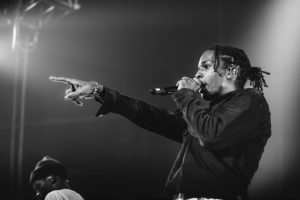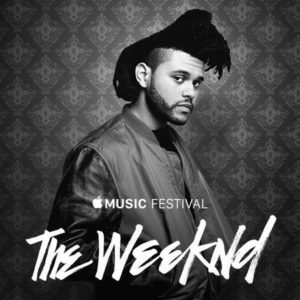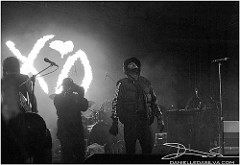A$AP Rocky Live Concert at Forest National Bruxelles-5462
Image by Kmeron on Flickr
A$AP Rocky’s single “F*cking Problems”, is a song widely known among teenagers in the USA. Rapping explicitly about calling women female dogs, using racial slurs such as the “N” word, having sex with multiple women at a time and including the use of drugs in the mix such as Cocaine and Marijuana. If these lyrics can be looked at as clearly offensive to almost anyone listening to them, why is it a huge part of our society? Does this language influence negative behavior? Or is it just harmless and use of Freedom of Speech? I believe there is no right or wrong answer to any of these questions, it is all on your personal perspective.
Expression and Artistic Values
I believe music can be used to express yourself. In a Rolling Stones article, Sex, Drugs and R&B: inside the Weeknd’s Dark Twisted Fantasy by Josh Eells, Abel Tesfaye or widely known as the Weeknd, writes his lyrics based on his life and dark experiences from growing up in Canada to now being a widely known R&B star.
The Weeknd Ad for Apple Music Festival
Image by __randy10__ on Flickr
The Weeknd’s controversial lyrics have made him known around as “the dark reality of the truth”, where fans can make connections or visualize his work. In the same Rolling Stones article, Abel describes one of his songs High for This, “The tone is dark, the environment is the dark. But there’s not force in it. They want to have a good time. Everybody wants to be there. Whether they regret their choices after is whatever. But everybody is in consent.” His work is upfront and clear, but also the truth.
Abel expresses his life through being different and controversial, but it doesn’t mean he is an overall negative person. Republic label head Monte Lipman has said, “One thing about Abel that people don’t realize is, he’s incredibly ambitious.” In his work environment at the studio, he is known as hard working. An art but a job to be taken seriously.
Abel Tesfaye not only uses his music to communicate with his audience, but it is something he does for himself. In an interview with Pitchfork he talks about his controversial lyrics, “And at the end of the day, my listeners love it, I love it, I hope you love it. [laughs] The music I make on this album is definitely matured. It’s a bit of a different state of mind even though it’s the same person. You grow and you grow and you don’t know what the next album is going to be about. You never know what I’m going to say.”
Abel live in Concert in London, Ontario
Image from Danielle Da Silva on Flickr
Research on Behavior
With anything, there is both positive and negative influences. In this article from the Daily Universe, Experts Debate Hip-Hop’s Influence on American Culture, Youth, for Better or for Worse by Chris Killion, has researchers discuss the positive and negative impacts on teenage youths listening to rap music.
From the previous article from the Daily Universe talks about the results, “Ralph DiClemente and some other of his colleagues researched 522 random African-American females from around the same area between the ages of 14 and 18. The researchers placed the young women into two categories: high exposure or average to low exposure. Average exposure was about 20 hours per week. The researchers found that after a year the subjects viewing habits did not change. Those in the high exposure group were more likely to take sexual risks and were less apt to use a condom. The high exposure group was less likely to disagree with their boyfriends about sexual behavior”
DiClemente said the negative behavior due to listening to the rap music may have not been all influential, but was strongly suggested.
There was also positive behavior discussed. Price has brought up expression, “At a certain level we need to listen to what these folks [rap artists] are saying because they are in a sense telling us perhaps what’s wrong in society or they may be telling us what’s good in society” These perspectives influence and can teach anyone listening a lesson. Not all of the messages the rapper creates, is to do what the rapper is saying, but maybe to avoid it.
Freedom of Speech
When you type the words “Freedom of Speech” into Google, you get this definition: “Freedom of Speech (noun): the right to express any opinions without censorship or restraint.
If the First Amendment protects the right of Freedom of Speech, why is expressing your opinions, without censorship, in song lyrics such a controversy? Being said already, I believe this is all perspective.
With any problem you have different people with different beliefs, with different backgrounds, with different knowledge… The list could go on.
A Never Ending Rap Battle
With any controversial topic there is endless views. You can choose to look at the negatives or the positives, and choose to be satisfied or disgusted. In Toni Akindele’s article on Kanye, “Are We Limiting Kanye West’s Creative Expression?”, she describes how Kanye does not want to have is expressions and ideas limited and to not be known with just a hip hop artist title and sees “the importance in the value of everyone being able to experience a more beautiful life.” With the battle of debate on explicit music, both sides make strong arguments. In conclusion, rap music has positive and negative influences and it is your choice on how you take it.
Featured image: ASAP Ferg Live In Concert Dec 11, 2013 @ The Opera House (Toronto) by The Come Up Show | Flickr



